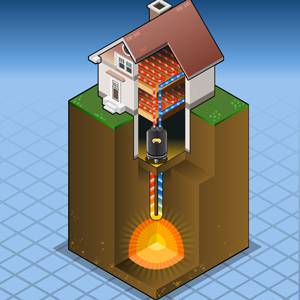When it comes to saving energy and money, geothermal heat pumps can do exactly that while doing something good for the environment as well.

So, is it the best system for your home? Here are 5 important facts you need to know about geothermal heat pumps before installing one.
1. It is more efficient than a conventional heating system.
Like a fridge, a geothermal heat pump uses the same principle for transferring heat from one source to another. But unlike the fridge which removes heat from its interior, a geothermal heat pump removes heat from the ground to any part of the house (or vice versa).
Geothermal heat pumps simply move existing heat from one place to another without the need for fuel to create warmth so it is vastly more efficient than a conventional heating system.
A conventional heating system uses air from external sources as a transfer medium so it racks up your energy consumption. Because underground temperature remains a relatively constant 50 degrees Fahrenheit year round, a geothermal heat pump requires a lot less energy to cool your home.
2. Its upfront costs are truly outrageous.
 There is no sugarcoating it – a geothermal heat pump will burn a big hole in your pocket. Depending on site accessibility, soil conditions, amount of digging and drilling required and other factors, installation expenses can go anywhere from costs $10,000 up to $30,000.
There is no sugarcoating it – a geothermal heat pump will burn a big hole in your pocket. Depending on site accessibility, soil conditions, amount of digging and drilling required and other factors, installation expenses can go anywhere from costs $10,000 up to $30,000.
Recouping your upfront costs through energy savings can take as little as four years or as long as a decade or more depending on the actual installation expenses plus your monthly utility rates.
3. It has really great benefits.
Lower operating costs. Yes, installation expenses alone is already hard to swallow but if you’ll consider as much as 60 percent savings on heating and cooling bills as compared to conventional heating and cooling systems, then it is really worth the price.
Environmental-friendly. It uses clean renewable solar energy. No greenhouse gas emissions nor carbon dioxide and carbon monoxide discharges as well. No combustion-related accidents or air quality issues inside your home to worry about.
Works well in both newly-constructed homes and retrofit situations. Less costs for new constructions but more expensive if there is a ductwork modification which is typical for retrofit situations.
Less noise. It is as loud as a refrigerator only because there are no noisy outdoor compressors or fans.
Low-maintenance and longer lifespan. Its indoor components can last up to three decades while underground components can live up to 50 years. Because it has fewer moving parts and protected from outdoor elements, minimal maintenance is required.
4. It has limitations.
First, it is not something that even the most avid and skilled do-it-yourselfer can successfully undertake on his or her own. Professional expertise is absolutely necessary considering the amount of money involved in its design, sizing and installation.
Because it has not been fully embraced by many homeowners, there are fewer installers and less competition, which explains its heavy price tag.
Because of the heavy drilling activity that goes along with it, it will require permits from your locality and might seriously affect your landscape. That is, if your lot is an ideal space for geothermal heat pumps. If not, then even if you have the cash to spend, you’ll just waste a perfectly good system that won’t work as efficiently as you hope it would be.
5. Overall costs will depend on the type of loop system.
The three types of loop systems are horizontal, vertical, and pond/lake loop system. Factors such as available land, soil conditions, required heating and cooling load climate, and local installation costs at the site will determine the type of loop system that is best for your property.
Is geothermal heat pump right for you?
- If you don’t mind shelling out for that outrageous installation expenses
- If your existing energy bills are at an all-time high every single month
- If you’re building a new house and can roll its upfront costs right into your mortgage
- If your goal is to save money in the long run, to not be bothered by constant repairs and maintenance, and protect the environment
Learn more about geothermal at www.energy.gov .













Write a Comment